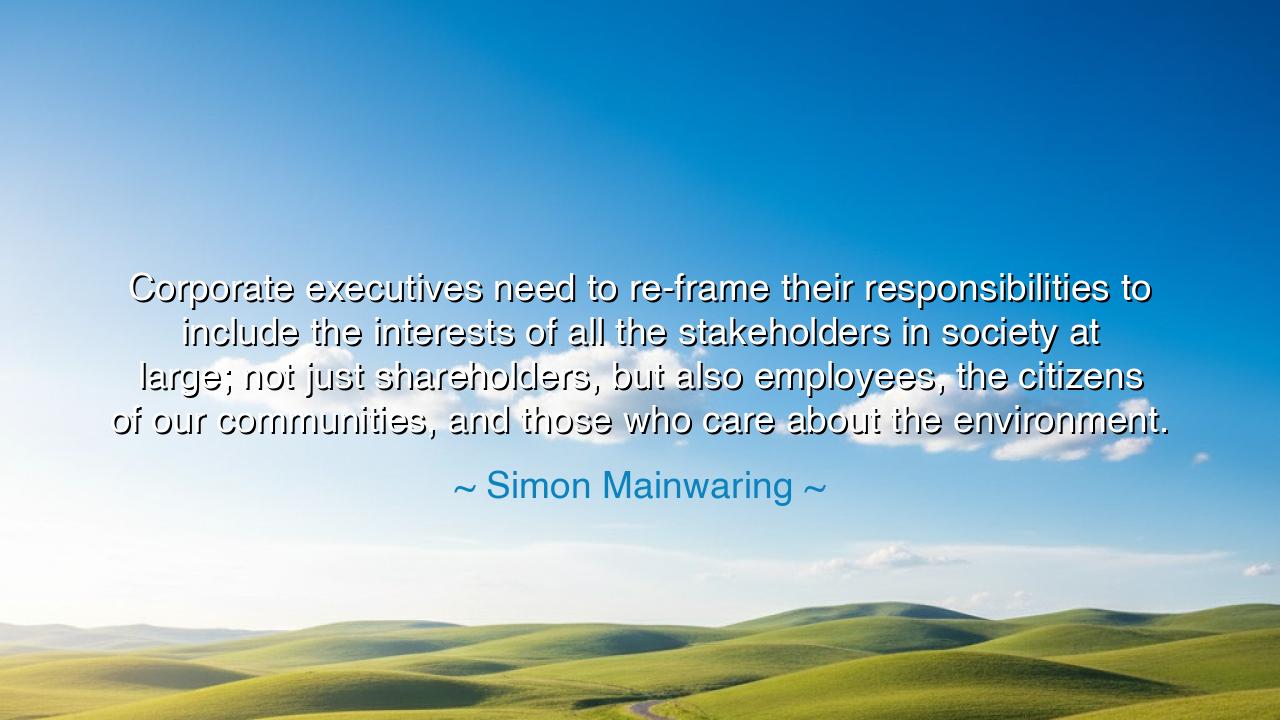
Corporate executives need to re-frame their responsibilities to
Corporate executives need to re-frame their responsibilities to include the interests of all the stakeholders in society at large; not just shareholders, but also employees, the citizens of our communities, and those who care about the environment.






Hearken, O children of commerce and guardians of tomorrow, to the voice of Simon Mainwaring, whose words resound with the weight of justice and truth: “Corporate executives need to re-frame their responsibilities to include the interests of all the stakeholders in society at large; not just shareholders, but also employees, the citizens of our communities, and those who care about the environment.” These are not the idle musings of one man, but the clarion call of an age that demands balance, fairness, and wisdom. For the time has come when the narrow pursuit of profit alone can no longer sustain the house of humanity.
In ancient times, rulers who governed only for their own enrichment brought ruin upon their lands. Empires crumbled not because they lacked gold, but because they forgot the people who tilled their fields, built their walls, and bled to defend them. So too in this age, the executives of corporations must recognize that their kingdoms do not rest solely upon the wealth of shareholders, but upon the living breath of workers, the trust of communities, and the fragile beauty of the environment. To forget this truth is to sow the seeds of collapse, just as surely as any reckless king who ignored his subjects.
Consider the tale of Henry Ford in the early 20th century. At a time when many industrial barons sought only to wring every ounce of labor from their workers, Ford made a choice that was radical for its age. He doubled the wages of his employees, ensuring that the very men and women who built his cars could also afford to buy them. Critics sneered, declaring it folly. Yet what followed was prosperity—not only for Ford, but for the community around him. By tending to the stakeholders beyond the shareholders, Ford created loyalty, stability, and growth. This is but one example of how wisdom in leadership can ripple through society like rain upon dry earth.
Yet the words of Mainwaring carry us further still, beyond the walls of factories and offices. He reminds us of the environment, the silent stakeholder that cannot raise its own voice. Rivers poisoned, skies darkened, forests felled—these are not merely external costs, they are debts written into the future of our children. A company that profits today by ravaging the earth will find its legacy cursed tomorrow. True greatness, therefore, lies not in the quick harvest of resources, but in stewardship—so that generations yet unborn may bless the name of those who walked before them.
And what of the citizens of our communities? Are they not the ground upon which every enterprise stands? If a corporation enriches its investors while leaving the community in poverty, is that not the act of a parasite, feeding upon its host until both perish? But when a company builds schools, supports families, and lends strength to its towns, then it becomes a pillar upon which the whole of society may rest. This truth was known to the guilds of medieval Europe, who gave back to their cities through art, infrastructure, and public works, leaving behind legacies that endure even now.
Therefore, let us declare: the responsibilities of leaders are far greater than balance sheets and stock prices. They must weave together profit with purpose, growth with generosity, and progress with protection. The call of Mainwaring is not a burden, but a liberation—for when companies embrace the well-being of all stakeholders, they find not weakness, but strength renewed, trust deepened, and honor eternal.
What lesson, then, must each soul carry from these words? That in our own lives, whether we are leaders of great companies or humble workers in the field, we too must look beyond our narrow self-interest. Support your colleagues, uplift your neighbors, guard the land and air that sustain you. Demand of corporations that they honor not just their investors, but the sacred circle of life itself. For every choice—what we buy, what we support, what we praise—echoes into the future.
Thus let it be said: the age of greed must give way to the age of stewardship. Executives must re-frame their responsibilities, and we must re-frame our own. For in the harmony of people, community, and nature lies not only survival, but the greatness of a civilization. May those who hear these words rise as guardians of this truth, that profit and purpose may walk hand in hand, and that the wealth of our age may become a blessing to all.






AAdministratorAdministrator
Welcome, honored guests. Please leave a comment, we will respond soon